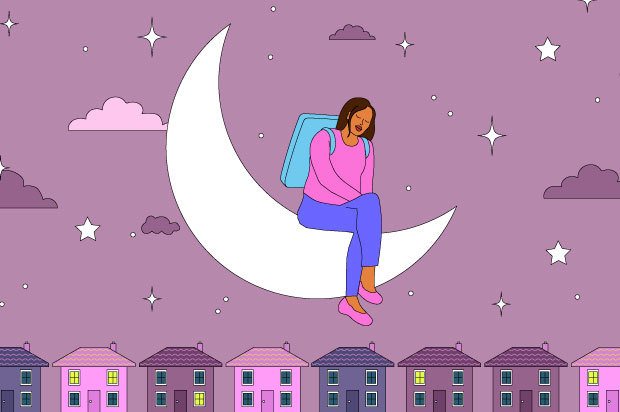A guide to coping with homelessness during lockdown

Being homeless or vulnerably housed is tough at the best of times, but with the added stress of coronavirus, it’s particularly challenging. Interruptions to vital services such as funding, food support and counselling can make it hard to know where to find help. But we want you to know, help is most definitely out there.
We spoke to Consultant Clinical Psychologist, Dr Amanda Skeate from St Basils – a youth homelessness charity – about where to get the support you deserve.
Who can get housing support?
Any young person who is either homeless or at risk of becoming homeless and doesn’t feel supported can get help.
Reasons why you might need to get in touch
You’re homeless with nowhere to go. Now more than ever, people need a safe place to live. Extra measures like using hotels and offices as hostels, have been put in place to ensure no one sleeps rough during the Corona crisis.
You think you might become homeless because of tensions at home. Lockdown can cause increased tension and arguments at home. And sadly there has been a rise in reports of domestic violence. If you feel forced to leave or you don’t feel safe at home, it’s important you ask for help.
You’re vulnerably housed and can’t access vital supplies. If you’re dependent on funding and food support but have seen an interruption to services, it’s important you seek support in order to keep accessing this essential support.
You’re homeless and considered high risk. If you have a health condition that puts you at greater risk from Coronavirus, let your key worker know this. They can make provisions to ensure you’re accommodated somewhere where you can safely self-isolate or shield.
Where can I go for support?
This depends on your situation:
If you already have a support worker/ key worker, it’s best to contact them. They will be able to signpost you to the relevant place.
If you are newly homeless or at risk of becoming homeless and don’t have a support worker, the best people to get in touch with is the housing team at your local council. You can find out who your local council is here. You will have a phone assessment with them and they will discuss your options.
If you are struggling to find the right number to call or have some unanswered questions, the youth homelessness charity Centrepoint has a free helpline or chat service for anyone in need of advice.
Other local homelessness organisations can be found using this database.
I’m homeless and worried about catching coronavirus
To stay safe we must strictly social distance and wash our hands incessantly. But how do you do that if you’re homeless? It’s not so easy, and that’s why it’s important you ask for help.
Some things to bear in mind:
All hostels and shelters are organised to ensure social distancing can take place. Staff and people being supported have been issued guidelines which they must stick to. If you’re using shared kitchen and bathroom facilities, be extra careful with hand hygiene.
Food packages, medication and general supplies can be delivered and will be left at your front door.
For those people with underlying health conditions such as asthma, it is important you let hostel staff or your support worker know so additional measures can be made to ensure your safety.
Many services such as counselling, phone assessments and talking with your support worker will now be done over the phone as opposed to face-to-face. This might feel strange at first but it can be just as supportive.
If you do become unwell, make sure you let staff know so the necessary things can be put in place for you to self-isolate. You can always ring your GP if you’re feeling particularly poorly or in extreme cases where you’re struggling to breathe, call 999.
I can’t pay my rent and am worried my landlord might kick me out
Coronavirus has meant lots of people are struggling financially – either because they’re unable to work or have lost their jobs. The government has put measures in place to ensure people aren’t evicted during the corona crisis ,but you may need to talk to your landlord.
Your options are:
Talk to your landlord – they may be able to reduce your rent or delay payment. The same applies to council tax and energy bills – get in touch with providers and let them know your situation as soon as possible.
You can get further advice about paying rent, council tax and bills during the health crisis here.
Contact your nearest Citizens Advice. They will be able to advise you on paying rent etc and could also talk to you landlord on your behalf if that would be helpful.
If you are on the brink of being evicted, you should contact your local housing authority at your local council who will assess your situation over the phone and talk about alternative accommodation.
You can get more legal advice from CRISIS, Shelter, YMCA, St Basils and NHAS.
Whatever your situation, remember that everyone deserves a safe place to live. If you feel unsafe or worried about your living situation, do not hesitate to ask for help. Help is out there.
Read our article on understanding your tenancy rights and our guide on what to do if you’re at risk of homelessness.
Next Steps
- Shelter offers advice on all housing issues. Get advice here or by calling their housing helpline 0808 800 4444. If you're in Scotland, use http://scotland.shelter.org.uk/
- Crisis helps single homeless people, aiming to break the cycle of homelessness.
- Chat about this subject on our Discussion Boards.
By Olivia Capadose
Updated on 29-Apr-2020
No featured article












